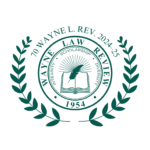Tag: Criminal Law
Caught in the Crossfire: The Dilemma of Marijuana “Medicalization” for Healthcare Providers
William Vertes & Sarah Barbantini Read More …
Criminal Procedure
Alan Gershel Read More …
Criminal Law
Stacey M. Studnicki & John P. Apol Read More …
The Impact of Heidi’s Law on Alcohol-Related Driving Offenses and Other Developments
Stacey M. Studnicki & John P. Apol Read More …
Vigilante Justice: Prosecutor Misconduct in Capital Cases
Jeffrey L. Kirchmeier, Stephen R. Greenwald, Harold Reynolds, & Jonathan Sussman Read More …
